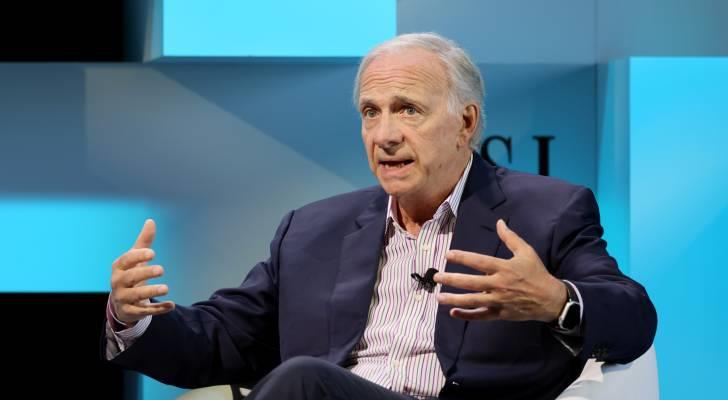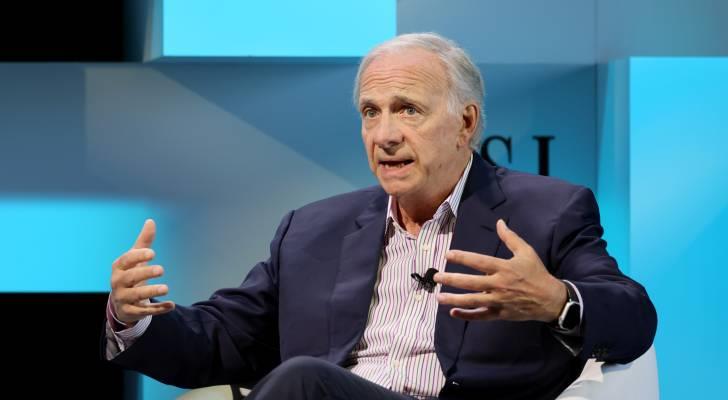
Ray Dalio Sounds Alarm Over Looming 'Civil War' In America - Claims Our Power To 'Hurt Each Other' Has Never Been Greater. Are You At Risk?

This article adheres to strict editorial standards. Some or all links may be monetized.
It's been more than 160 years since America's last civil war - but billionaire investor Ray Dalio is warning that another one may be brewing.
Must Read-
Thanks to Jeff Bezos, you can now become a landlord for as little as $100 - and no, you don't have to deal with tenants or fix freezers. Here's how
Dave Ramsey warns nearly 50% of Americans are making 1 big Social Security mistake - here's what it is and 3 simple steps to fix it ASAP
I'm 49 years old and have nothing saved for retirement - what should I do? Don't panic. Here are 6 of the easiest ways you can catch up (and fast)
In a recent interview on Leaders with Francine Lacqua, Dalio was confronted with a blunt question:“Could we be close to another world war?”
He didn't hesitate.“We are in wars,” Dalio replied.“There is a financial money war, there's a technology war, there's geopolitical wars and there are more military wars.” (1)
Then came his more unsettling assessment: the U.S. itself isn't immune.
“We have a civil war of some sort, which is developing in the United States and elsewhere, where there are irreconcilable differences,” Dalio said.
He outlined two paths the country could take.
The first, more hopeful scenario is one in which Americans“rise above it and realize that our common good is going to necessitate us dealing with it so that what works for most people is going to work.” But as he admitted, that may be“a little bit idealistic.”
The second is far bleaker:“I think that these conflicts will become tests of power by each side.”
It's a stark warning - especially from someone who also cautioned earlier in the interview that“our power to hurt each other has never been greater.”
This isn't the first time Dalio has sounded the alarm about America's internal fractures. In a recent post on X, he wrote:“From studying 50-plus civil wars and revolutions, it became clear that the single most reliable leading indicator of civil war or revolution is bankrupt government finances combined with big wealth gaps.” (2)
And the U.S. is edging dangerously close to that description.
The national debt has climbed to $37.92 trillion, with a debt-to-GDP ratio of 125%, up from 100% a decade ago. Dalio has warned that when debt rises relative to income, it's like“plaque in the arteries” - eventually choking off spending. (1)
Meanwhile, wealth inequality has ballooned. The wealthiest 1% of Americans now hold 31% of the nation's net worth - up from 22.8% in 1989. (3) By contrast, the bottom 50% watched their share shrink from 3.5% to just 2.5% over the same period, Federal Reserve data shows. (4)
Those widening gaps - combined with rising fiscal strain - are precisely the kind of warning signs Dalio says often precede civil wars and revolutions.
If his warning has you on edge and wondering how to protect your wealth in turbulent times, it may be worth considering assets that can help weather a crisis.
Read more: How much cash do you plan to keep on hand after you retire? Here are 3 of the biggest reasons you'll need a substantial stash of savings in retirement
Dalio's go-to asset for 'bad times'Amid his dire forecasts, Dalio has repeatedly emphasized the importance of diversification - and singled out one time-tested asset as a cornerstone of a resilient portfolio: gold.
“People don't have, typically, an adequate amount of gold in their portfolio,” he told CNBC earlier this year.“When bad times come, gold is a very effective diversifier.”
He doubled down on that view more recently at the Greenwich Economic Forum, calling gold a“very excellent diversifier in the portfolio.”
“If you look at it just from a strategic asset allocation perspective, you would probably have something like 15% of your portfolio in gold... because it is the one asset that does very well when the typical parts of the portfolio go down,” Dalio explained.
Long viewed as the ultimate safe haven, gold isn't tied to any single country, currency or economy. It can't be printed out of thin air like fiat money and in times of economic turmoil or geopolitical conflicts, investors tend to pile in - driving up its value.
Over the past 12 months, gold prices have surged by more than 50%.
One way to invest in gold that also provides significant tax advantages is to open a gold IRA with the help of Thor Metals.
Gold IRAs allow investors to hold physical gold or gold-related assets within a retirement account, which combines the tax advantages of an IRA with the protective benefits of investing in gold, making it an attractive option for those looking to potentially hedge their retirement funds against economic uncertainties.
To learn more, you can get a free information guide that includes details on how to get up to $20,000 in free metals on qualifying purchases.
Warren Buffett's advice on what to own in a warInvesting legend Warren Buffett has also offered clear money advice for politically-volatile times.
In 2014 - the last time Russia invaded Ukraine - Buffett told CNBC that“the last thing you'd want to do is hold money during a war,” because in“virtually” every conflict he's aware of, the value of money would go down. (5)
So what does he recommend owning when the world is on edge?
“You might want to own a farm, you might want to own an apartment house, you might want to own securities,” Buffett said.
Indeed, real assets like apartment buildings have the potential to create returns through thick and thin. In fact, Buffett has repeatedly pointed to real estate as a prime example of a productive, income-generating asset.
In 2022, Buffett stated that if you offered him“1% of all the apartment houses in the country” for $25 billion, he would“write you a check.” (6)
Real estate also offers a natural hedge against inflation - a point that aligns with Buffett's warning about the erosion of money's value during wartime. When inflation rises, property values often increase as well, reflecting the higher costs of materials, labor and land. At the same time, rental income tends to go up, providing landlords with a revenue stream that adjusts with inflation.
Of course, you don't need billions - or even to buy an entire property - to invest in real estate. Crowdfunding platforms like Arrived offer an easier way to get exposure to this income-generating asset class.
Backed by world class investors like Jeff Bezos, Arrived allows you to invest in shares of rental homes with as little as $100, all without the hassle of mowing lawns, fixing leaky faucets or handling difficult tenants.
The process is simple: browse a curated selection of homes that have been vetted for their appreciation and income potential. Once you find a property you like, select the number of shares you'd like to purchase and then sit back as you start receiving any positive rental income distributions from your investment.
Another option is Homeshares, which gives accredited investors access to the $35 trillion U.S. home equity market - a space that's historically been the exclusive playground of institutional investors.
Homeshares allows accredited investors to gain direct exposure to a portfolio of owner-occupied homes in top U.S. cities through their U.S. Home Equity Fund - without the hassles of buying, owning or managing property.
The fund focuses on homes with substantial equity, using Home Equity Agreements (HEAs) to let homeowners access liquidity without taking on debt or interest payments. This creates an attractive, low-maintenance investment vehicle for retirement savers, with a minimum investment of $25,000.
With risk-adjusted target returns of 14% to 17%, the U.S. Home Equity Fund offers investors access to America's largest store of household wealth.
And for a limited time, Homeshares will provide Moneywise readers an exclusive 5% bonus for IRA investments.
A finer alternativeIt's easy to see why great works of art tend to appreciate over time. Supply is limited and many famous pieces have already been snatched up by museums and collectors. That scarcity also makes art an attractive option for investors looking to diversify and preserve wealth during periods of uncertainty and inflation.
In 2022 - shortly after U.S. inflation hit a 40-year high - a collection of art owned by the late Microsoft co-founder Paul Allen sold for $1.5 billion at Christie's New York, making it the most valuable collection in auction history. (7)
Investing in art was traditionally a privilege reserved for the ultra-wealthy.
Now, that's changed with Masterworks - a platform for investing in shares of blue-chip artwork by renowned artists, including Pablo Picasso, Jean-Michel Basquiat and Banksy.
From their 23 exits so far, Masterworks investors have realized representative annualized net returns like +17.6%, +17.8% and +21.5% among assets held for longer than one year. Simply browse their impressive portfolio of paintings and choose how many shares you'd like to buy. Masterworks will handle all the details, making high-end art investments both accessible and effortless.
New offerings have sold out in minutes, but you can skip their waitlist here.
See important Regulation A disclosures at Masterworks/cd.
What to read next-
Want an extra $1,300,000 when you retire? Dave Ramsey says this 7-step plan 'works every single time' to kill debt, get rich in America - and that 'anyone' can do it
'Rich Dad, Poor Dad' author Robert Kiyosaki says this 1 asset will surge 400% in a year - and he begs investors not to miss its 'explosion'
There's still a 35% chance of a recession hitting the American economy this year - protect your retirement savings with these 5 essential money moves ASAP
This tiny hot Costco item has skyrocketed 74% in price in under 2 years - but now the retail giant is restricting purchase. Here's how to buy the coveted asset in bulk
Join 200,000+ readers and get Moneywise's best stories and exclusive interviews first - clear insights curated and delivered weekly. Subscribe now.
Article sourcesWe rely only on vetted sources and credible third-party reporting. For details, see our editorial ethics and guidelines.
@business (1 ); @RayDalio (2 ); Federal Reserve Bank of St. Louis (3; 4 ); @CNBC (5 ); CNBC (6 ); Christie's (7 )
This article provides information only and should not be construed as advice. It is provided without warranty of any kind.
Legal Disclaimer:
MENAFN provides the
information “as is” without warranty of any kind. We do not accept
any responsibility or liability for the accuracy, content, images,
videos, licenses, completeness, legality, or reliability of the information
contained in this article. If you have any complaints or copyright
issues related to this article, kindly contact the provider above.
















Comments
No comment